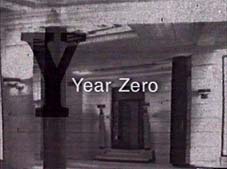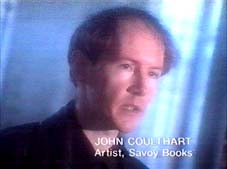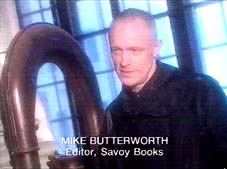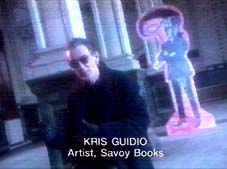| HOME | BOOKS | COMICS | RECORDS | NEWS | PEOPLE | PICTURES | ORDERS | HISTORY | office@savoy.abel.co.uk |
 | Waterstone’s Interview b y M a t t L e y s h o n Matt Leyshon for Blood From 'Stones, Waterstone's, Salisbury, talks to Michael Butterworth, John Coulthart and Kris Guidio, April 1998. |
|
|
|
|
| 
Michael Butterworth Only in a personality or personal 'taste' sense. We started out by reprinting a lot of what we felt were neglected works—particularly by writers and artists like Henry Treece, Jack Trevor Story and Ken Reid. David Mitchell, in his forthcoming book about us (Savoy and Lord Horror—A Serious Life), is trying to find a 'unifying theory', but it's more of a vision than a message. Our work crosses genres, formats, media... Kris Guidio In my opinion, no. Savoy doesn't have a message running through its range of publications. Any litanies that may surface from time to time come from the nightmares, real and otherwise, that David Britton writes about; the drifts and accessories of speech are never those of the fashionably élite or the brief tastes of the aware. Savoy is often a place of rancours, scurvy sorts and odd silhouettes scaling the ramparts after dark. It's an often frivolous look at certain realities. You need too much time on your hands to bother with 'messages'.
MB Lord Horror is a pulp archetype of the Twentieth Century, rooted in the fin de siècle and '50s' rock'n'roll. He is modelled very loosely on William Joyce—Lord Haw-Haw—the Irish-American who forged British nationality to join the British Army. During the Second World War Joyce became a collusionist mouthpiece for the Nazis, and made radio broadcasts from Germany, and was hung by the Brits—on a technicality, for he wasn't British—as a traitor. But actually, at his height as a broadcaster he had a bigger audience rating than the BBC, and he embarrassed the British establishment. This figure of Haw-Haw's, and the fact that the Second World War—his time of operation—was the defining boundary of the Nineteenth and Twentieth Centuries (before then, the West was, apart from its art, still a Nineteenth Century culture) enabled us to build the Horror archetype. We could encompass all of the Twentieth Century through this still-potent figure. John Coulthart The three central characters in Reverbstorm, Lord Horror (Haw-Haw), Jessie Matthews and James Joyce were all active in the Twenties and Thirties, the height of Modernism. Even though the series takes place in the fictional city of Torenbürgen, the predominant atmosphere is from that period from about 1914-45 when enormous advances were taking place in art and science alongside the darkest events in human history. The tumult of that period is a source of endless fascination and its reverberations are still being felt today. Although this isn't the first time James Joyce has appeared in a comic strip, I felt that we could use his presence more effectively by taking Modernist themes and techniques (and a liberal helping of pulp fiction) as a basis for the series. Since we had one of the century's greatest writers in Joyce it was logical to use its greatest painter, Picasso, as a visual counterpoint. The use of Guernica is particularly pertinent, it being the most famous anti-fascist statement in art, which is used in ironic juxtaposition with Lord Horror's anti-Semitic pronouncements. KG When you go to Mass, you expect church furnishings to surround you: the clientele expect it, and if they don't, then they should. Perhaps they need to lose a pew or two before they start to miss them. At heart it all becomes a matter and a moment of taste: and Britton and Butterworth have always had the most voluptuous. You would never find a muscle man in a coloured leotard within Savoy pages. You can get that anywhere else.
JC Writers, JG Ballard, Michael Moorcock, Alan Moore, Iain Sinclair...artists, Ernst Fuchs, H R Giger, Mati Klarwein, Gerald Scarfe, Joel-Peter Witkin. KG Peter Ackroyd, David Britton, Simon Callow and Howard Jacobson. MB Moorcock, Ballard, Andrea Dworkin, Alan Moore, Iain Sinclair, Thomas Harris...Giger, Scarfe...
JC General influences are too numerous to detail. Artistic influences on Reverbstorm include: Watchmen, Burne Hogarth's Tarzan, David Lynch, Hugh Ferris, Piranesi, King Kong, Joel-Peter Witkin, Aubrey Beardsley, Harry Clarke, James Cawthorn and Gustave Doré... KG Stanley Spencer, Edward Hopper and Matt Wagner...
KG H E Bates's The Darling Buds of May, Herman Melville's Moby Dick... JC Literary influences on Reverbstorm include William Hope Hodgson, HP Lovecraft, David Lindsay, William Burroughs, James Joyce, T S Eliot...
MB The Herbert Huncke Reader, edited by Benjamin G Schafer and published by William Morrow. Huncke was the Times Square hustler who died last year and who turned Burroughs on to junk, who turns out to be a good writer and recorder of the scene, the criminal drifters and loners that he meets in a life lived mainly on the streets and in rooming houses; Mao II, Don Delillo's novel about the novelist's power to influence society being upstaged by the terrorist's; and Descartes' Error, by Antonio R Damasio, about the importance of emotions in rational thought. JC The Great White Wonders, a history of rock bootlegs by Clinton Heylin from Penguin, and The Romantic Agony, the seminal study of Romantic literature by Mario Praz. I recently finished Metal Sushi, a great collection of Lovercraftian cyberpunk stories by new writer David Conway, which is due from Oneiros Books in the summer. I painted the jacket. KG John Osborne's Luther and Freud's Interpretation of Dreams.
MB Lord Horror will become a classic...it is already an underground cult classic of a kind, though not in the same way as Last Exit, which appeals to the sexually voyeuristic. Lord Horror is a lot more taboo. It would have become a classic if it hadn't been prosecuted. We tried to get Faber & Faber to publish it, but they missed their chance! KG "A hundred literatures make the canon of my heart." When Laforgue wrote that, he was commenting how people often only read a book's reputation, and missed its basic style and content. That's very much the case with Lord Horror; a few hysterics managed to keep it out of the book stores. Sooner or later Lord Horror will see his place in the sun.
MB Things change, things stay the same. Today you can say 'fuck' in the media, but we have lost the right to take mescaline, which in the early sixties you could buy over the counter of your local chemist. You can't say 'golliwog' now, but you can have legal abortion. Before anyone gets at me for saying that, I don't believe abortion can be compared with censorship of words, but it is a freedom, which we have now and didn't have then, which we could easily lose again.
JC "What comes into the world and disturbs nothing deserves neither consideration nor patience." René Char's words exemplify Savoy's definition of the rock'n'roll attitude, not so much a specific cultural reference, more a position of singular vision and anarchic drive; the maverick spirit. All the people Savoy has published or promoted over the years have been mavericks of one sort or another, usually creating similar maverick individuals in their respective works or personae. Savoy Rock'N'Roll means wild imagination, furious energy, vision always burning with a hard gem-like flame and no small amount of bad taste; as another maverick, Pablo Picasso, once said: 'Good taste is the enemy of creativity'. MB Savoy has always had a strong '50s rock'n'roll stance, which is mainly Dave's influence. I've always been interested in experiment and the future, and freedom of expression. Dave is more traditionalist, emotionally. We are linked by our interest in the bizarre and by our wanting to get things done. I sometimes act as a moderator of his excesses, though I think it was me who insisted on the first berserk use of the word 'fuck', on the printed centres of our early PJ Proby releases—'All rights reserved. The BPI and the Performing Rights Society can go fuck themselves'. That was because we were getting hassled by both organisations—the BPI were trying to charge us money on records pressed when the other side of the music industry was refusing to distribute us, and our records were lying in our warehouse unsold; the Performing Rights Society were trying to prosecute our shop managers for playing music in their shops, which they were playing for personal consumption. When our influences combine effectively, Dave and I produce the equivalent of a Rock ballad. Rock'n'Roll, to be good, is a visual aural display of clever outrage and shock—it's the 'fuck-you' of the ego—we're a mixture of that and sensible moderation.
MB I have always seen it as a battle to reach a certain ground before you are struck down, but once you have reached that ground it no longer matters if you are stopped. I think we have reached that ground. Lord Horror now has a life of his own. At the same time we are self-preservationists. We don't fight on pointlessly. We admitted defeat in our fight to get a jury trial for our comics—which were destroyed on the orders of a single magistrate who effectively decided what the rest of the country could read. However, if the Manchester police raid our comics again they will find we have learned strategic legal lessons which won't make it so easy for them. I think they know this, so they're leaving us alone. JC Giving up is only an option to people who treat the process of creating art as a job rather than a way of life. Considering that artists and writers in many countries can lose their lives for offending the state, it seems rather faint-hearted to bow to police pressure here. Think of any book that authorities have tried to ban this century, then try to recall the names of those who tried to ban it. We rest our case.
JC The future would be brighter for everybody if this country had a constitutional right to freedom of speech like most of our civilised neighbours. Despite our relative freedoms, this is still the most censorious country in the free world. Until people can protect themselves against random raids by the aesthetically ignorant drones in Customs or the police force, trying to enforce unworkable laws, the clock can always be turned back at a moment's notice. In the present situation even libraries are unsafe as the recent seizure of a book of Mapplethorpe photographs from the University of Central England demonstrates. And let's not forget David Blunkett's moaning about Shopping and Fucking; New Labour—same old Tory moralising. MB The irony of Waterstones is that they were bought out by W H Smiths, who were always the guardians of 'family values'. Hence things have changed since The Savoy Book was published in 1978—entrepreneurs like Tim Waterstone have adapted, and Waterstones (W H Smiths) are now beginning to take our books. I hope, if shops take our product they will find it will sell. Titan, whom you might have thought at one time should have been our natural distributors, have always played safe.
MB We would like to see Lord Horror commercialised as a character. We would like someone to come forward and help us do this. The actor-producer David Glass is currently making a Lord Horror short film, and film is what interests us most at the moment. Our aims are no different than when we founded Savoy. We are just more focussed, and instead of producing other people we are producing ourselves. We have always known what we are doing but I think now we are doing it much better.
KG Savoy comics exist beyond almanacs and taste; they take you to where existence meets imagination; where baboons drink mineral water and howl at the moon; where Elgar puts Brendan Behan to music and Elvis is only half dead. It's about being different in a mirror. MB Just go and buy a Savoy product! Read Reverbstorm whilst you are listening to PJ Proby's Hardcore, or read Harlan Ellison's The Glass Teat whilst you are listening to Reverbstorm. Take to bed with you The Adventures of Meng & Ecker and Fudge and the Dragon, or Henry Treece's The Great Captains and James Cawthorn's adaptation of Jewel in the Skull...
MB Kerry Richardson filmed us and Alan Moore for an episode called 'Year Zero'. The series was intended to go out in April 1996, and the BBC Books publication—which is an exact pictorially-assisted sequence of the films as they were meant to be shown in the TVseries—shows you what could have been. It is a very good book. But someone at the BBC lost their nerve. Instead of making cutting edge television of the quality of, say, Dancing in the Streets, or Channel Four's The Art of Tripping, which they had it in their hands to do, they treated the genre of Horror with less respect. When they finally screened A-Z, after prevaricating for over a year, they cut out all the modern and urban horror—H R Giger, us, Alan Moore, David Cronenberg, the rap artists Gravediggaz (Dennis Wheatley was left in), and messed around with the films. They ruined the editing in some cases, and shoved the series out on the graveyard slot. The final episode was never shown. I think it was obviously censorship, but it was also stupidity. But buy the book, preferably the US Harper Prism edition, which is a hardback. KG The entire series was screwed up from start to finish. If the censor did have a hand in our section, we owe him a debt. • |
| Main People Page |



